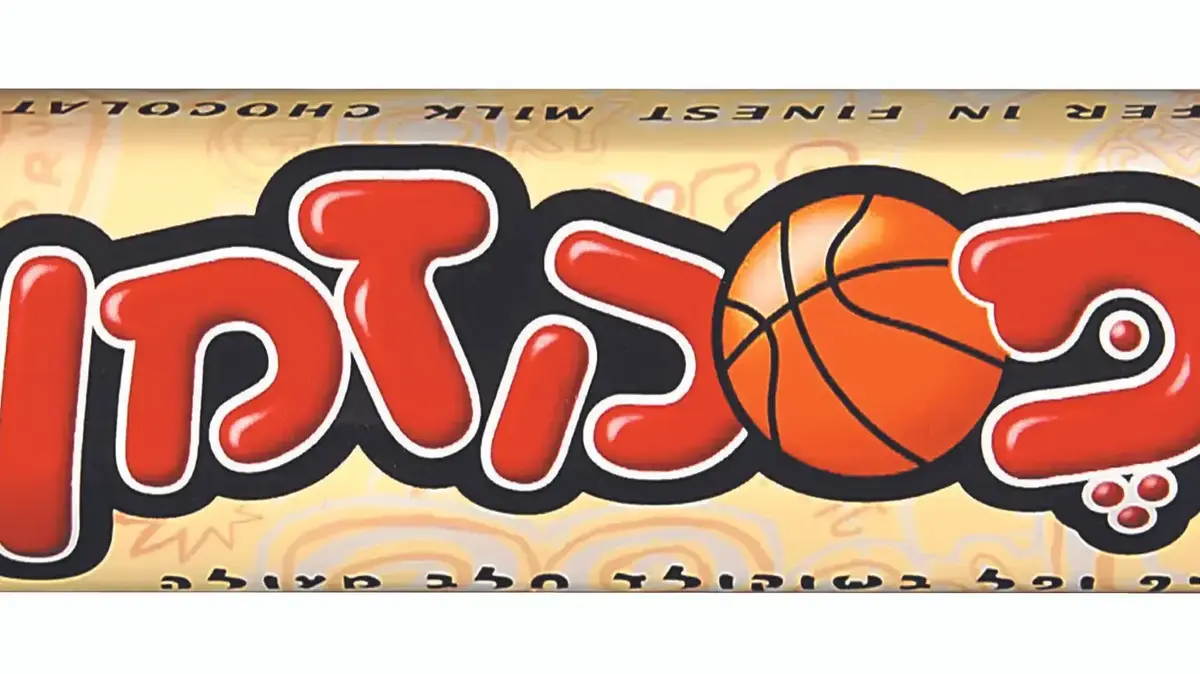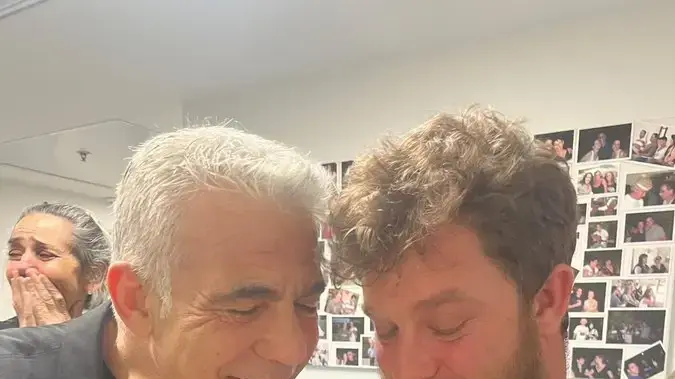The favorite sweet snack of all time in Israel.
The classic packaging of Time Out, from more than 40 years ago (Photo: Studio Strauss)
Elite's chocolate bar 'Pasak Zeman', was born in the early 80's.
He won the hearts of the Israelis and did well to appeal to the local taste.
During all its 40 years, it was considered the best-selling and best-loved chocolate snack in Israel, and as such it never stopped surprising and gave birth to countless special editions, a variety of sizes, shapes and flavors, accompanied by iconic advertisements ("Take a break - a sweet moment in life", remember?).
What made Elite's chocolate bar legendary?
Who thought of the name and how after decades, it is still considered the favorite snack of Israelis?
In honor of its return to the shelves after the salmonella crisis, we went on a journey during a "time-out".
David Moshavitz, who was one of the founders of the "Alit" company, agreed to reveal behind-the-scenes secrets of the production process.
We heard from him about the first snack that came out for tasting, about genius creative, about crises, shortcomings and turning points that affected the image of the snack and brought it to keep its place at the top of chocolate snacks.
Moshavitz: "At the time, before the 'time out' was born, Elite's chocolates were divided into cow chocolate and chocolate bars. We had flavors, tortilla, twist, and good taste, but we really wanted to refresh the series of chocolate bars with a new product, the intention was to combine Waffles and with chocolate, a combination that was already known in the world - the crispiness of waffles with the softness of chocolate. The snacks that were before the timeout were coated or molded and the innovation brought by the timeout was that the chocolate was molded but also filled."
David Moshavitz, one of the founders of "Alit" (today part of the Strauss Group) (photo: courtesy of the photographer, courtesy of the photographer)
Love at first sight
Moshavitz continues: "At that time, the early 1980s, we had a food technologist named Yoram Goldstein and he was given the task of developing a new chocolate-based product combined with waffles, and I suggested adding nut cream as well, with these instructions he set off."
And how was the name chosen?
"I don't remember who suggested the name 'timeout', but I remember saying that the name was certain even before we had the product, which is not generally accepted in the manufacturing world."
Even from the distance of the many years that have passed since then, Moshavitz manages to remember the last tasting that approved the product for mass production: "One day I came to the office in the morning and the snack was on my desk. Usually, when we taste a snack for the first time, we have some kind of criticism: remove, add, change... . and it takes at least 5-6 rounds of tastings after improvements until the final product is approved. But here it was definitely love at first sight. With the first taste, we knew that this time we had hit the nail on the head and this snack was destined to be a success.
We started to organize for production, we set a quantity that was considered particularly large in those days for a first edition, we decided that this large quantity would be the measure of success.
But then an interesting thing happened, already in the first days of the release of "Time Out" on the market, we experienced a crazy demand that we could not have expected.
No big dream of success prepared us for demands on such a scale.
Within two days there was a huge shortage, the agents at the points of sale asked us to supply them more and quickly, but we did not have the ability and the ability to meet the required quantities, the planned production was limited and did not keep up with the demand, we did not prepare for
an unusual demand like the one created by the time out."
The period of the shortage lasted almost a year and during that time, the level of demand did not decrease until the time came and the snack returned to the shelves.
The period of shortage led to a situation where some tried to get a "time-out" through personal connections: "People, from the sellers in Israel at that time, called me and said, 'Uncle, you must get me a time-out, the grandchildren are driving me crazy,'" Moshvitz says.
What else was amazing to see is that the increase in demand during the timeout did not harm the other chocolate bars. Strauss-Elite admits that sometimes the release of a new and successful snack may come at the expense of a decrease in demand for other snacks. The timeout, on the other hand - according to the company's reports - did not result in a decrease in demand for other products. How Do they explain it? Maybe because it was different from all other chocolate products - molded and filled.
More in Walla!
Do not compromise on unsatisfactory sex: this is how you will improve performance - with an exclusive discount
Served on behalf of "Gabra"
Is lack the perfect marketing? (Photo: Maariv)
A marketing ploy?
At the time of the great shortage, at the same time that Moshevitz is being blamed for not anticipating the demand, an article was published in the Haaretz newspaper by a professor of economics who wrote about the "genius marketing exercise of Elite" and noted that "creating a shortage in order to increase demand is a well-known marketing method"
. Over the years, Moshavitz humbly removes this crown from his head: "How can it be that my mistake makes me a marketing genius?
I saw it as an omission that I didn't know how to anticipate the demand.
It was really not planned and not a marketing stunt, if I had known in advance that this would be the demand I would have prepared for it.
I don't believe in such exercises, people want to buy and I want to sell, I believe that the chocolate you didn't sell today, you lost on it."
Meanwhile, behind the scenes of the production, the elite realized the magnitude of the demand and the production volumes they required, and accordingly, they were reorganized.
A new machine was ordered from Italy, and massive pressure was exerted to receive it as soon as possible, "We opened a separate production line just for a 'time-out', and only further down the road, we used the machine to produce the fun-spoof that came out a year and a half later."
"Want to hear something?"
He adds in a joking tone: "In the last few months when the candy factory was closed, people called me and said to me, 'We feel like 40 years ago when the timeout came and it was impossible to get it.'"
Compared to the demands we recently became aware of with the crantz pistachio, Moshvitz claims that "this Not even similar to what it was then.
Today it is just a passing trend.
We didn't release the product to make noise for a few months, we looked at the long term and you can see that to this day, 40 years later, timeout is one of the most successful snacks."
When Moshavitz is asked, what was the main reason why a timeout conquered the Israelis, he claims that, as always in the field of food, it is the taste that determines: "I think we hit the taste of a lot of people. Admittedly, the seal does not indicate its pulp, but it really is the tastiest snack out there The combination of waffles, melted chocolate and nuts does its job."
"I think the timing of the product's launch also had something to do with the tremendous demand. There was a very big inflation then, what happens today in a year, then happened in a week. I think the public was thirsty for something sweet and new in that difficult period."
Moshavitz also adds that the chosen name and the broad and creative advertising that came out at that time - were very successful - and not only at that time, but remain relevant even today.
"As far as I know, to this day timeout is Elite's best-selling snack."
Originally, according to Moshavitz, the snack was intended for the age group of 20-30 year olds, but in retrospect, a time-out apparently managed to cross preferences that are usually divided by age and is consumed both among children and teenagers and among the elderly.
Kevin Magee, who was then a big star in every house in Israel, in a time-out commercial.
Complete identification with Maccabi "Elite" Tel Aviv (photo: courtesy of Weimar Tamir Cohen)
Advertising and Maccabi Tel Aviv
"I'm not sure, but to the best of my recollection, the first campaign we started with him was with Mickey Berkowitz from Maccabi Tel Aviv in basketball and the plan was to run with him for a long period of time, but pretty early on we stopped the publication, which is also considered a very unusual step, because we thought it was the right thing to do, When the demand is so great and we don't have the possibility to supply," recalls Shovitz.
The first campaign, which was stopped prematurely, was resumed by 'Alit' only after it managed to significantly increase production.
It seems that over the years, the snack's advertisements created a media buzz and were well-engraved among the target audience.
The most successful time-out campaign is probably the ad with the Hertz runner in Kenya, who stops at a red light and takes a time-out.
The general idea that the ad was trying to convey was that time out comes everywhere.
And Elit's suggestion to stop the race of life for a moment and enjoy the little things captured the hearts of the viewers, until almost every person in Israel knew how to hum: "Take a break, a sweet moment in life."
"This commercial was among the first to be filmed abroad.
In the first ten years of the brand, there were no advertisements on television at all and of course not on the internet and social networks, the only place where the advertisements were broadcast was the cinema before a movie screening.
I imagine that if the timeout had been released today, in the era of social networks, the madness would have been many times greater."
And there was another important element derived both from the name of the snack and from the close cooperation between Elite and the Maccabi Tel Aviv basketball team. The adoption of the team by the candy manufacturer began in the years The 70th, long before the launch of 'Pasak Zaman': "In my conversation with Shimon Mizrahi, we created a collaboration in which we stamped the basketball illustration on the chocolate and the logo of the product when the ball replaced the letter S in the name 'Pasak Zaman'."
But it should be noted that the collaboration was with Elite and not specifically with the snack itself: "Back then we were groundbreaking in the collaboration between Maccabi and Elite. Today, every group has a collaboration with a commercial company, we were the first in Israel to do that."
As part of the collaboration, the Elite logo was on the players' shirts and at that time, only the first channel was on television, with a ban on broadcasting advertisements.
"All of Maccabi's games were broadcast on the only channel. Almost the entire country would watch the games, Maccabi Tel Aviv was a national craze and thus we were even more exposed to the general public."
And what is the biggest achievement of the iconic snack?
Moshavitz concludes: "After going through crises and shortages, he is celebrating 40 years - and this is his greatest success."
Between more than 40 - and never stops renewing (Photo: Studio Strauss)
Of money
Tags
Strauss Elite
elite
Timeout















